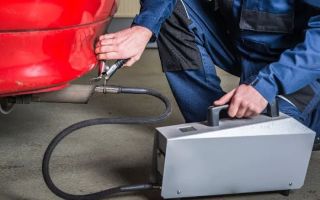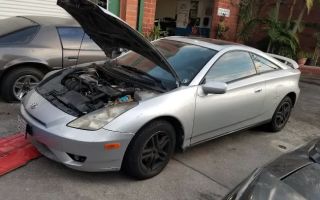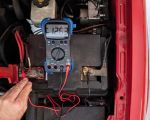How to Prolong the Life of Your Car Battery
As a car owner, one of the most frustrating situations I’ve encountered is when my car battery dies unexpectedly. Whether you're heading to work, running errands, or on a road trip, the last thing you want is for your car to fail to start because of a dead battery. Over the years, I’ve learned that the longevity of a car battery depends on several key factors, and by taking proper care, I can significantly extend its lifespan. In this article, I’ll share the best practices for prolonging the life of your car battery, based on my personal experiences and expert advice.

Pick Your Part - Help Yourself
1232 Blinn Ave, Wilmington, CA 90744, USA
1. Regularly Check Your Battery’s Health
One of the easiest ways to prolong your car battery's life is by checking its condition regularly. It's important to inspect your battery for any visible signs of wear or damage, such as corrosion around the terminals or any cracks in the casing. If I notice any corrosion, I carefully clean the terminals using a mixture of baking soda and water. This helps to prevent any buildup of gunk, which can prevent the battery from charging properly. Additionally, I always make sure that the battery terminals are tightly connected. Loose connections can cause the battery to work harder, shortening its life.

Pick Your Part - Greer
13054 E Wade Hampton Blvd, Greer, SC 29651, USA
2. Keep the Battery Clean
Keeping your car battery clean is crucial to its longevity. Dust, dirt, and moisture can accumulate around the battery terminals, leading to corrosion. When cleaning, I use a battery cleaning brush or an old toothbrush to gently scrub around the terminals. Be cautious, though, as you don't want to spill any cleaning solution onto the battery itself. If you do, quickly wipe it away with a cloth. Regular cleaning prevents the battery from losing charge and ensures that it remains in good condition.
3. Limit Short Trips
Another factor that can shorten the life of your car battery is taking frequent short trips. I’ve found that car batteries often don’t have enough time to fully charge when I only drive short distances. If you tend to take quick drives around town, your alternator might not have enough time to recharge the battery fully. Over time, this will cause the battery to wear down faster. If I know I’m going to be making short trips, I try to make time for a longer drive once a week to allow the battery to recharge properly.
4. Avoid Extreme Temperatures
Extreme temperatures, both hot and cold, can have a significant impact on the life of your car battery. In the winter months, cold temperatures can cause the battery fluid to freeze, which can lead to internal damage. On the other hand, heat can cause the battery fluid to evaporate, making it harder for the battery to function efficiently. To protect the battery, I always make sure my car is parked in a shaded area during hot weather, and I use a battery insulator in the winter to keep it from freezing. This has helped me maintain the battery's health for much longer.
5. Turn Off All Electronics When Not in Use
When I leave my car parked for an extended period, I make sure to turn off all electronics inside, including lights, radio, and air conditioning. Leaving these accessories on can put unnecessary strain on the battery, depleting its charge. I’ve found that turning off all electrical components when starting the car ensures that the battery is not overworked from the start, which can also prevent premature wear and tear.
6. Ensure the Battery Is Properly Charged
One of the most important steps in maintaining your car battery is ensuring that it remains properly charged. I avoid letting the battery get too low before recharging it, as deep discharges can shorten its lifespan. If I notice that my car's electrical components are functioning sluggishly or that it takes longer than usual to start, I immediately get the battery checked. Keeping the battery at the optimal charge level is crucial for its longevity and performance.
7. Get Your Battery Tested Regularly
Just as regular maintenance is important for your car's engine, it’s equally important to have the battery tested periodically. I recommend getting your car battery tested every six months, especially before the change of seasons. This can help identify any potential issues before they become major problems. A battery test will give you insight into the current state of your battery, and whether it might need replacing soon.
8. Replace the Battery When Needed
Eventually, every car battery will reach the end of its life. However, I’ve found that by following the above tips, I’ve been able to extend my car battery's lifespan beyond the typical 3-5 years. Despite all efforts to prolong the life of the battery, sometimes it’s simply time for a new one. It’s a good idea to replace the battery before it fails completely, especially if you notice any symptoms of battery issues, such as dim headlights or slow engine cranking. Replacing the battery at the right time can prevent the frustration of a sudden breakdown.
9. Use the Right Battery for Your Vehicle
Choosing the right battery for your vehicle can make all the difference in terms of performance and longevity. I always make sure to select a battery that’s compatible with my car's make and model. The right battery will provide the proper voltage and reserve capacity required for my car’s needs, ensuring that the engine starts smoothly and the electrical components are powered efficiently. Consulting your car’s owner manual or a professional can help you make the best choice.
10. Preventive Maintenance Is Key
Lastly, I’ve learned that proactive maintenance is key to preventing issues before they arise. Regular servicing of your car and battery system can help detect any underlying problems early on. I always keep an eye on my car’s overall performance, and if I notice any unusual behavior, such as strange noises or difficulty starting the engine, I take it to a mechanic right away. Regular checkups help ensure that my car and its battery run smoothly for years.


























